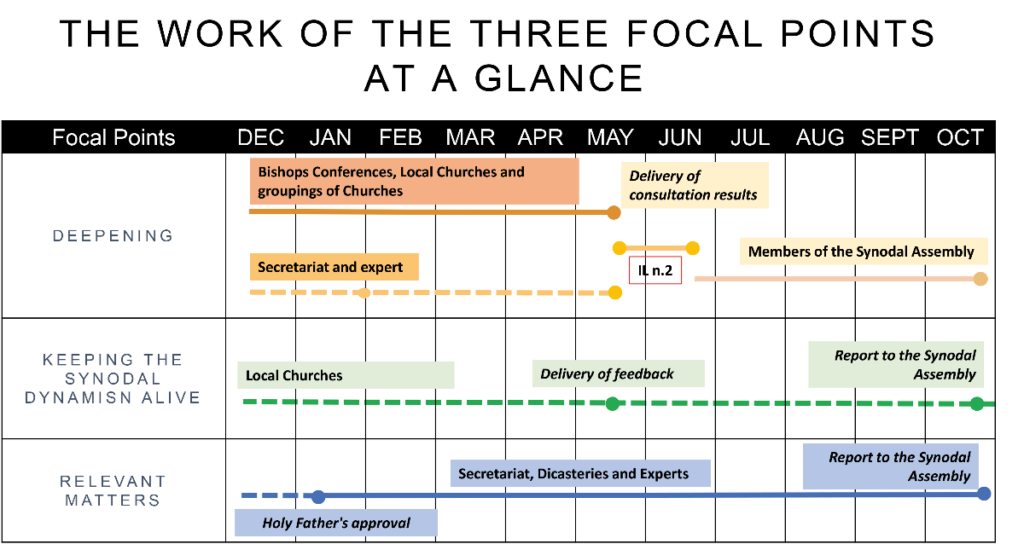Guidelines for work in view of the 2024 Assembly released

At the end of their meeting on 5 December, the members of the Ordinary Council of the Synod of Bishops adopted a Document for the work to be engaged by the Catholic Church until the celebration of the Second Session of the XVI Ordinary General Assembly of the Synod of Bishops (October 2024).
These are guidelines with a concrete roadmap in which the deepening of synodality in a missionary perspective and the broadening of experiences of synodality at the local level are the cornerstones on which the local communities are called to reflect, beginning with the Synthesis Report adopted at the end of the First Session of the XVI Assembly on 28 October. As the Holy Father recalled when approving these work guidelines, “the Synod is about synodality and not about this or that theme… The important thing is how the reflection is done, that is, in a synodal way”.
“Building on the experience of last October’s assembly, and especially on the Synthesis Report that the members approved, the Ordinary Council decided on a unified yet differentiated path depending on the competencies and possibilities within local ecclesial realities,” says Cardinal Mario Grech, Secretary General of the Synod, adding, “This is already a synodal way of working in the Church where each person cooperates for the good of all according to his or her vocation”.
In fact, keeping the two main themes or guidelines in mind, the dioceses are asked:
1) with regard to deepening: to promote a reflection that focuses on the theme of differentiated co-responsibility in the mission of all members of the People of God (cf. Synthesis Report, chapters 8-12, 16 and 18). The local Churches are asked to carry out a further consultation, involving people and groups (parish priests, participation bodies, synodal teams, etc.) who express a variety of experiences, skills, charisms, ministries within the People of God and whose point of view is of particular help in focusing on “how” to grow as a synodal Church. In this sense, the involvement of experts and academic institutions present in the area seems indispensable, so that the contribution of theological and canonical expertise, as well as the relevant human and social sciences, can be present;
2) regarding the broadening of experiences of synodality: to continue or promote new initiatives to grow as a synodal church on mission, with training and listening experiences that also involve those who have not been touched by the process so far, groups living in conditions of poverty and social marginality as well as Christians of different denominations and people of other religions; to collect and transmit testimonies and best practices to be sent to the Synod Secretariat through the Bishops’ Conferences or the Eastern Hierarchical Structures.
In order to facilitate the work of the local communities, the General Secretariat has prepared a possible work sheet to help the work of receiving the fruits of October’s synod assembly and of continuing the synodal journey of conversion in the local Churches.
The Bishops’ Conferences and the Oriental Hierarchical Structures are asked to accompany the work of the local Churches by offering them the indications regarding the ways and times of the in-depth study and work; to also promote their reflection on differentiated co-responsibility with regard to mission especially at the level of the groupings of Churches (regional, national, international) and in the relations between the Churches and the Bishop of Rome; to elaborate the synthesis of the contributions of the in-depth study received from the local Churches and/or produced at the national level, and to send them, together with the best practices collected by the local Churches, to the General Secretariat of the Synod by 15 May.
At the same time, the General Secretariat of the Synod will promote and coordinate reflection on some “major” issues in the Synthesis Report that must be handled at the level of the whole Church and in collaboration with the Dicasteries of the Roman Curia. In the manner that is proper to Synodal Assemblies, a list of topics will be submitted to the Holy Father. Groups of experts from all continents, with the involvement of the relevant Dicasteries of the Roman Curia, will be called to work in a synodal manner on the topics that Pope Francis will indicate. A report on the progress of this work will be presented at the Second Session in October 2024.
In all this work, the members and all the participants of the XVI Ordinary General Assembly of the Synod of Bishops, appointed by the Holy Father, will have the important task of being ambassadors of the path taken and will be called upon to be the real points of reference for their respective ecclesial realities.
The DOCUMENT is available here
The WORKSHEET is available here


